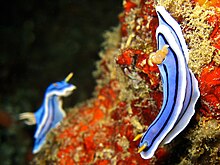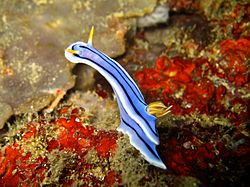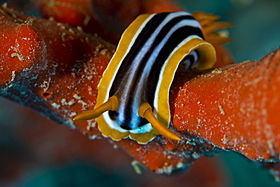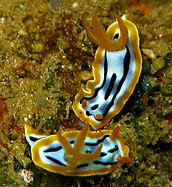User:Autumnabennett/sandbox
Below are my personal contributions. At the bottom is the complete version of the article for grading!!!!
Chromodoris is a genus of very colourful sea slugs or dorid nudibranchs, marine gastropod molluscs, and the type genus of in the family Chromodorididae. Within the Chromodoris genus, there are currently 101 classified species. Species within Chromodoris are commonly found in tropical and subtropical waters, living as members of reef communities and preying primarily on sponges.[1] A molecular phylogeny of the family Chromodorididae resulted in this genus being restricted to a smaller number of species than formerly, most of which have longitudinal black lines on the mantle. Many former members of Chromodoris were transferred to Goniobranchus.
Anatomy
[edit]Chromodoris is a genus of dorid nudibranchs, which exhibit one of the two major body types found within Nudibranchia. There are a few major bodily features that separate chromodorids from other sea slugs.
Mantle
[edit]Dorids have a thick mantle that exists over their foot, and in some species, the mantle can have tubercles (nodules along the surface of an organism that are made of keratin)[2] of different concentrations, shapes, and sizes, providing some rigidity and protection for their soft, shell-less bodies. In most dorid species, the mantle holds toxins that defend the organism that are obtained through their diet.
Rhinophores
[edit]They also, like other sea slugs, have rhinophores, a set a of sensory tentacles at the head of the organism. These provide a sense of taste and smell. They can be retracted into the organism into a structure called a basal sheath, and the rhinophores themselves can come in a diverse array of shapes that are important to species identification.
Respiratory System
[edit]Chromodorids breathe oxygen principally through their gills, usually positioned in a featherlike structure located around the anus at their posterior, called the branchial plume. [3]
Phylogeny and Taxonomy
[edit]The the classification of the family Chromodorididae has been the subject of many studies on nudibranches in recent years, most focusing on the phylogeny and it's impact on the traditional taxonomies of the genera. Chromodoris was long considered to be the most diverse genus of the Chromodorididae, however, A study published in July of 2018 on indo-pacific species of chromodorid nudibranchs has shown that the genus should be categorized more strictly, and has been narrowed down to 22 species. These species characteristically have black stripes along their bodies and linear spawning. [4]
Chemical Defenses
[edit]Chromodorid nudibranchs commonly exhibit chemical defenses to protect themselves from predators. Most of the species that exhibit this behavior make use of bioactive compounds like alkaloids, diterpenes, and sesquiterpenes from the sponges they feed on. Nudibranchs can collect these compounds and store them as is, transform them, or be selectively sequestered, although there is no information on how common each mechanism is and which individual species exhibit the individual methods. Chromodorid nudibranchs in particular transport and store their toxic compounds in specialized storage glands located in strategic locations throughout the mantle, called mantle dermal formations (MDFs). These MDFs have been shown to harbor extremely high concentrations of distasteful and potent compounds in comparison to the rest of their body.[5]
Reproduction
[edit]All nudibranchs are simultaneous hermaphrodites, with each individual possessing both male and female reproductive structures. During mating, two individuals compete for the position of male by darting their penises at one another until the victor penetrates the body wall of the other and impregnating them, forcing them to act as the female, an act commonly called "penis fencing." From here, the female lays eggs into a substrate, which hatch planktonic vestigial veliger larva, who will further evolve into adults.[6]
 | This is a user sandbox of Autumnabennett. You can use it for testing or practicing edits. This is not the sandbox where you should draft your assigned article for a dashboard.wikiedu.org course. To find the right sandbox for your assignment, visit your Dashboard course page and follow the Sandbox Draft link for your assigned article in the My Articles section. |
Citations
[edit]- ^ Johnson, Rebecca Fay (2008). "History of the chromodorid nudibranchs: Nomenclature, phylogenetics, biogeography and classification". ProQuest. ProQuest 304661522.
- ^ "Tubercles". Fishionary. May 2018.
- ^ "Basic Anatomy of the Sea Slug". The Invertebrate Collections of the University Museum of Bergen. December 2018.
- ^ Layton, Kara K.S. (July 2018). "Flexible colour patterns obscure identification and mimicry in Indo-Pacific Chromodoris nudibranchs (Gastropoda: Chromodorididae)". Molecular Phylogenetics and Evolution. 124: 27–36. doi:10.1016/j.ympev.2018.02.008. PMID 29476907. S2CID 4872462 – via Web of Science.
- ^ Carbone, Marianna (April 2013). "Packaging and Delivery of Chemical Weapons: A Defensive Trojan Horse Stratagem in Chromodorid Nudibranchs". PLOS ONE. 8 (4): e62075. doi:10.1371/journal.pone.0062075. PMC 3631210. PMID 23620804. ProQuest 1344056819.
- ^ Parducho, Vina Angelica (April 2015). "Reproduction of Chromodoris lochi". SeaLifeBase.
COMPLETE ARTICLE:
[edit]Chromodoris is a genus of very colourful sea slugs or dorid nudibranchs, marine gastropod molluscs, and the type genus of in the family Chromodorididae. Within the Chromodoris genus, there are currently 101 classified species. Species within Chromodoris are commonly found in tropical and subtropical waters, living as members of reef communities and preying primarily on sponges.[1] A molecular phylogeny of the family Chromodorididae resulted in this genus being restricted to a smaller number of species than formerly, most of which have longitudinal black lines on the mantle. Many former members of Chromodoris were transferred to Goniobranchus.
| "Chromodoris" | |
|---|---|

| |
| "Chromodoris lochi." | |
| Scientific classification | |
| Kingdom: | |
| Phylum: | |
| Class: | |
| (unranked): | |
| Superfamily: | |
| Family: | |
| Genus: | Chromodoris |
| Type species | |
| "Doris magnifica" Quoy & Gaimard, 1832 | |
| Species | |
|
| |
| Synonyms | |
|
Actinodoris Ehrenberg, 1831 (Invalid: Placed on the Official Index by ICZN Opinion 1375) | |
Anatomy
[edit]Chromodoris is a genus of dorid nudibranchs, which exhibit one of the two major body types found within Nudibranchia. There are a few major bodily features that separate chromodorids from other sea slugs.
Mantle
[edit]Dorids have a thick mantle that exists over their foot, and in some species, the mantle can have tubercles (nodules along the surface of an organism that are made of keratin)[3] of different concentrations, shapes, and sizes, providing some rigidity and protection for their soft, shell-less bodies. In most dorid species, the mantle holds toxins that defend the organism that are obtained through their diet.
Rhinophores
[edit]They also, like other sea slugs, have rhinophores, a set a of sensory tentacles at the head of the organism. These provide a sense of taste and smell. They can be retracted into the organism into a structure called a basal sheath, and the rhinophores themselves can come in a diverse array of shapes that are important to species identification.
Respiratory System
[edit]Chromodorids breathe oxygen principally through their gills, usually positioned in a featherlike structure located around the anus at their posterior, called the branchial plume. [4]
Phylogeny and Taxonomy
[edit]The the classification of the family Chromodorididae has been the subject of many studies on nudibranches in recent years, most focusing on the phylogeny and it's impact on the traditional taxonomies of the genera. Chromodoris was long considered to be the most diverse genus of the Chromodorididae, however, A study published in July of 2018 on indo-pacific species of chromodorid nudibranchs has shown that the genus should be categorized more strictly, and has been narrowed down to 22 species. These species characteristically have black stripes along their bodies and linear spawning. [5]
Chemical Defenses
[edit]Chromodorid nudibranchs commonly exhibit chemical defenses to protect themselves from predators. Most of the species that exhibit this behavior make use of bioactive compounds like alkaloids, diterpenes, and sesquiterpenes from the sponges they feed on. Nudibranchs can collect these compounds and store them as is, transform them, or be selectively sequestered, although there is no information on how common each mechanism is and which individual species exhibit the individual methods. Chromodorid nudibranchs in particular transport and store their toxic compounds in specialized storage glands located in strategic locations throughout the mantle, called mantle dermal formations (MDFs). These MDFs have been shown to harbor extremely high concentrations of distasteful and potent compounds in comparison to the rest of their body.[6]
Reproduction
[edit]All nudibranchs are simultaneous hermaphrodites, with each individual possessing both male and female reproductive structures. During mating, two individuals compete for the position of male by darting their penises at one another until the victor penetrates the body wall of the other and impregnating them, forcing them to act as the female, an act commonly called "penis fencing." From here, the female lays eggs into a substrate, which hatch planktonic vestigial veliger larva, who will further evolve into adults.[7]
Species
[edit]Species in the genus Chromodoris include:
- Chromodoris africana Eliot, 1904
- Chromodoris aila Er. Marcus, 1961
- Chromodoris albolimbata Bergh, 1907
- Chromodoris albonotata Bergh, 1875
- Chromodoris alternata Burn, 1957
- Chromodoris ambigua Rudman, 1987
- Chromodoris annae Bergh, 1877
- Chromodoris aspersa Gould, 1852
- Chromodoris barnardi (Collingwood, 1868)
- Chromodoris boucheti Rudman, 1982
- Chromodoris briqua Marcus & Burch, 1965
- Chromodoris buchananae Gosliner & Behrens, 2000
- Chromodoris burni Rudman, 1982
- Chromodoris camoena Bergh, 1879
- Chromodoris cardinalis Bergh, 1880
- Chromodoris colemani Rudman, 1982
- Chromodoris dianae Gosliner & Behrens, 1998
- Chromodoris dictya Er. Marcus & Ev. Marcus, 1970
- Chromodoris elisabethina Bergh, 1877
- Chromodoris euelpis Bergh, 1907
- Chromodoris hamiltoni Rudman, 1977
- Chromodoris inconspicua Eliot, 1904
- Chromodoris inopinata Bergh, 1905
- Chromodoris joshi Gosliner & Behrens, 1998
- Chromodoris kuiteri Rudman, 1982
- Chromodoris lapinigensis Bergh, 1879
- Chromodoris lata Risbec, 1928
- Chromodoris lentiginosa Pease, 1871
- Chromodoris lineolata Hasselt, 1824
- Chromodoris lochi Rudman, 1982
- Chromodoris magnifica Quoy & Gaimard, 1832 : Type species.
- Chromodoris mandapamensis Valdes, Mollo, & Ortea, 1999
- Chromodoris mariana Bergh, 1890
- Chromodoris marpessa Bergh, 1905
- Chromodoris michaeli Gosliner & Behrens, 1998
- Chromodoris nodulosa Bergh, 1905
- Chromodoris nona (Baba, 1953)
- Chromodoris ophthalmica Bergh, 1905
- Chromodoris orientalis Rudman, 1983
- Chromodoris pantharella Bergh, 1879
- Chromodoris papulosa Bergh, 1905
- Chromodoris paupera Bergh, 1877
- Chromodoris perola Ev. Marcus, 1976
- Chromodoris porcata Bergh, 1889
- Chromodoris pustulans Bergh, 1877
- Chromodoris quadricolor Rueppell & Leuckart, 1828
- Chromodoris roseopicta Verrill, 1900
- Chromodoris rudolphi Bergh, 1880
- Chromodoris splendens Eliot, 1904
- Chromodoris striatella Bergh, 1877
- Chromodoris strigata Rudman, 1982
- Chromodoris tenuilinearis Farran, 1905
- Chromodoris tenuis Collingwood, 1881
- Chromodoris thompsoni Rudman, 1983
- Chromodoris trouilloti Risbec, 1928
- Chromodoris venusta Bergh, 1905
- Chromodoris virginea Bergh, 1877
- Chromodoris westraliensis O'Donoghue, 1924
- Chromodoris willani Rudman, 1982
- Synonyms
- Chromodoris albonaresRudman, 1990: synonym of Goniobranchus albonares(Rudman, 1990)
- Chromodoris albopunctataGarrett, 1879: synonym of Goniobranchus albopunctatusGarrett, 1879
- Chromodoris albopustulosaPease, 1860: synonym of Goniobranchus albopustulosus(Pease, 1860)
- Chromodoris aliusRudman, 1987: synonym of Goniobranchus alius(Rudman, 1987)
- Chromodoris agassizii: synonym of Felimare agassizii(Bergh, 1894)
- Chromodoris annulataEliot, 1904: synonym of Goniobranchus annulatus(Eliot, 1904)
- Chromodoris antonii: synonym of Mexichromis antonii(Bertsch, 1976)
- Chromodoris aureomarginataCheeseman, 1881: synonym of Goniobranchus aureomarginatus(Cheeseman, 1881)
- Chromodoris aureopurpureaCollingwood, 1881: synonym of Goniobranchus aureopurpureus(Collingwood, 1881)
- Chromodoris aurigeraRudman, 1990: synonym of Goniobranchus aurigerus(Rudman, 1990)
- Chromodoris australis: synonym of Thorunna australis(Risbec, 1928)
- Chromodoris banksi: synonym of Glossodoris dalli(Bergh, 1879)
- Chromodoris baumanniBertsch, 1970: synonym of Glossodoris baumanni(Bertsch, 1970)
- Chromodoris bennetti: synonym of Hypselodoris bennetti(Angas, 1864)
- Chromodoris bimaensisBergh, 1905: synonym Goniobranchus bimaensisBergh, 1905
- Chromodoris binzaEv. Marcus & Er. Marcus, 1963: synonym of Felimida binza(Ev. Marcus & Er. Marcus, 1963)
- Chromodoris bistellata: synonym of Aphelodoris antillensis
- Chromodoris britoiOrtea & Pérez, 1983: synonym of Felimida britoi(Ortea & Perez, 1983)
- Chromodoris bullocki: synonym of Hypselodoris bullocki
- Chromodoris californiensis: synonym of Hypselodoris californiensis
- Chromodoris cantrainiiBergh, 1879: synonym of Felimare picta(Schultz in Philippi, 1836)
- Chromodoris carnea: synonym of Hypselodoris carnea
- Chromodoris cazaeGosliner & Behrens, 2004: synonym of Goniobranchus cazae(Gosliner & Behrens, 2004)
- Chromodoris charlottaeSchrödl, 1999: synonym of Goniobranchus charlottae(Schrödl, 1999)
- Chromodoris clenchiRussell, 1935- the harlequin blue doris: synonym of Felimida clenchi(Russell, 1935)
- Chromodoris clitonotaBergh, 1905: synonym of Durvilledoris lemniscata(Quoy & Gaimard, 1832)
- Chromodoris coiRisbec, 1956: synonym of Goniobranchus coi(Risbec, 1956)
- Chromodoris collingwoodiRudman, 1987: synonym of Goniobranchus collingwoodi(Rudman, 1987)
- Chromodoris conchyliataYonow, 1984: synonym of Goniobranchus conchyliatus(Yonow, 1984)
- Chromodoris dalli: synonym of Glossodoris dalli(Bergh, 1879)
- Chromodoris daphneAngas, 1864: synonym of Goniobranchus daphne(Angas, 1864)
- Chromodoris decoraPease, 1860: synonym of Goniobranchus decorus(Pease, 1860)
- Chromodoris dollfusi: synonym of Hypselodoris dollfusi
- Chromodoris elegans(Cantraine, 1835): synonym of Felimare picta(Schultz in Philippi, 1836)
- Chromodoris elegantulaPhilippi, 1844: synonym of Felimida elegantula(Philippi, 1844)
- Chromodoris epicuriaBasedow & Hedley, 1905: synonym of Goniobranchus epicurius(Basedow & Hedley, 1905)
- Chromodoris fentoniValdés, Gatdula, Sheridan & Herrera, 2011: synonym of Felimida fentoni
- Chromodoris festiva: synonym of Mexichromis festiva(Angas, 1864)
- Chromodoris fidelisKelaart, 1858: synonym of Goniobranchus fidelis(Kelaart, 1858)
- Chromodoris flava: synonym of Diversidoris flava(Eliot, 1904)
- Chromodoris francoisae: synonym of Mexichromis francoisae(Bouchet, 1980)
- Chromodoris galactosRudman& Johnson in Rudman, 1985: synonym of Goniobranchus galactos(Rudman & S. Johnson, 1985)
- Chromodoris galexorumBertsch, 1978: synonym of Felimida galexorum(Bertsch, 1978)
- Chromodoris geminusRudman, 1987: synonym of Goniobranchus geminus(Rudman, 1987)
- Chromodoris geometricaRisbec, 1928: synonym of Goniobranchus geometricus(Risbec, 1928)
- Chromodoris ghanensis: synonym of Glossodoris ghanensis
- Chromodoris ghardagana[sic]: synonym of Hypselodoris ghardaqana(Gohar & Aboul-Ela, 1957)
- Chromodoris glenieiKelaart, 1858: synonym of Goniobranchus gleniei(Kelaart, 1858)
- Chromodoris godeffroyana: synonym of Risbecia godeffroyana
- Chromodoris goslineriOrtea & Valdés in Ortea, Valdés & Garcia Gómez, 1996: synonym of Felimida goslineri(Ortea & Valdés, 1996)
- Chromodoris grahamiThompson, 1980: synonym of Felimida grahami
- Chromodoris haliclona: synonym of Noumea haliclona
- Chromodoris heatheraeGosliner, 1994- Red-spotted nudibranch: synonym of Goniobranchus heatherae(Gosliner, 1994)
- Chromodoris hintuanensisGosliner & Behrens, 1998: synonym of Goniobranchus hintuanensis(Gosliner & Behrens, 1998)
- Chromodoris hunteraeRudman, 1983: synonym of Goniobranchus hunterae(Rudman, 1983)
- Chromodoris imperialis: synonym of Risbecia imperialis(Pease, 1860)
- Chromodoris kempfi: synonym of Mexichromis kempfi
- Chromodoris kitaeGosliner, 1994: synonym of Goniobranchus kitae(Gosliner, 1994)
- Chromodoris kponeEdmunds, 1981: synonym of Felimida kpone(Edmunds, 1981)
- Chromodoris krohniVérany, 1846: synonym of Felimida krohni(Vérany, 1846)
- Chromodoris kunieiPruvot-Fol, 1930: synonym of Goniobranchus kuniei(Pruvot-Fol, 1930)
- Chromodoris lekkerGosliner, 1994: synonym of Goniobranchus lekker(Gosliner, 1994)
- Chromodoris lemniscata: synonym of Durvilledoris lemniscata
- Chromodoris leopardus: synonym of Goniobranchus leopardusRudman, 1987
- Chromodoris lilacina(Gould, 1852): synonym of Tayuva lilacina(Gould, 1852)
- Chromodoris lineata nigrolineata: synonym of Hypselodoris nigrolineata
- Chromodoris loringiAngas, 1864: synonym of Goniobranchus loringi(Angas, 1864)
- Chromodoris luteopunctataGantes, 1962: synonym of Felimida luteopunctata(Gantès, 1962)
- Chromodoris luteoroseaRapp, 1827: synonym of Felimida luteorosea(Rapp, 1827)
- Chromodoris macfarlandiCockerell, 1901- Three-stripe doris: synonym of Felimida macfarlandi(Cockerell, 1901)
- Chromodoris maculosa: synonym of Hypselodoris maculosa
- Chromodoris marenzelleriBergh, 1888: synonym of Hypselodoris festiva(A. Adams, 1861)
- Chromodoris mariei: synonym of Mexichromis mariei
- Chromodoris marislaeBertsch in Bertsch, Ferreira, Farmer, & Hayes, 1973: synonym of Felimida marislae(Bertsch, 1973)
- Chromodoris maritimaisa: synonym of Hypselodoris maritima
- Chromodoris multimaculosaRudman, 1987: synonym of Goniobranchus multimaculosus(Rudman, 1987)
- Chromodoris naikiValdes, Mollo, & Ortea, 1999: synonym of Goniobranchus naiki(Valdés, Mollo & Ortea, 1999)
- Chromodoris neonaMarcus, 1955: synonym of Felimida neona(Er. Marcus, 1955)
- Chromodoris nigrostriataa: synonym of Hypselodoris nigrostriata
- Chromodoris norrisiFarmer, 1963: synonym of Felimida norrisi(Farmer, 1963)
- Chromodoris nyalya: synonym of Hypselodoris nyalya(Ev. Marcus & Er. Marcus, 1967)
- Chromodoris obsoletaRüppell & Leuckart, 1831: synonym of Goniobranchus obsoletus(Rüppell & Leuckart, 1831)
- Chromodoris orsinii: synonym of Felimare orsinii
- Chromodoris paulomarcioiDominguez, Garcia & Troncoso, 2006: synonym of Felimida paulomarcioiDominguez, Garcia & Troncoso, 2006
- Chromodoris peasei: synonym of Hypselodoris peasei
- Chromodoris perplexa: synonym of Digidentis perplexa
- Chromodoris petechialisGould, 1852: synonym of Goniobranchus petechialis(Gould, 1852)
- Chromodoris placida: synonym of Hypselodoris placida
- Chromodoris porterae: synonym of Mexichromis porterae
- Chromodoris pongaEr. Marcus & Ev. Marcus, 1970: synonym of Felimida ponga(Er. Marcus & Ev. Marcus, 1970)
- Chromodoris preciosaKelaart, 1858: synonym of Goniobranchus preciosus(Kelaart, 1858)
- Chromodoris purpureaRisso in Guerin, 1831: synonym of Felimida purpurea(Risso in Guérin, 1831)
- Chromodoris pusilla: synonym of Durvilledoris pusilla
- Chromodoris regalisOrtea, Caballer & Moro, 2001: synonym of Felimida regalis(Ortea, Caballer & Moro, 2001)
- Chromodoris reticulata(Quoy & Gaimard, 1832) : synonym of Goniobranchus reticulatus(Quoy & Gaimard, 1832)
- Chromodoris roboiGosliner & Behrens, 1998: synonym of Goniobranchus roboi(Gosliner & Behrens, 1998)
- Chromodoris rodomaculataOrtea & Valdés, 1991: synonym of Felimida rodomaculata(Ortea & Valdés, 1992)
- Chromodoris rolaniOrtea, 1988: synonym of Felimida rolani(Ortea, 1988)
- Chromodoris rosansBergh, 1889: synonym of Hypselodoris rosans(Bergh, 1889)
- Chromodoris rubrocornutaRudman, 1985: synonym of Goniobranchus rubrocornutus(Rudman, 1985)
- Chromodoris rufomaculataPease, 1871: synonym of Goniobranchus rufomaculatus(Pease, 1871)
- Chromodoris rufomarginata(Bergh, 1890): synonym of Glossodoris rufomarginata(Bergh, 1890)
- Chromodoris runcinataBergh, 1877: synonym of Hypselodoris infucata(Rüppell & Leuckart, 1831)
- Chromodoris ruzafaiOrtea, Bacallado, & Valdes, 1992: synonym of Felimida ruzafai(Ortea, Bacallado & Valdés, 1992)
- Chromodoris saintvincentius: synonym of Hypselodoris saintvincentius
- Chromodoris sedna: synonym of Glossodoris sedna
- Chromodoris semperi nigrostriata: synonym of Hypselodoris nigrostriata
- Chromodoris sibogae: synonym of Glossodoris sibogae
- Chromodoris sinensisRudman, 1985: synonym of Goniobranchus sinensis(Rudman, 1985)
- Chromodoris socorroensisBehrens, Gosliner & Hermosillo, 2009: synonym of Felimida socorroensis(Behrens, Gosliner & Hermosillo, 2009)
- Chromodoris sonora: synonym of Glossodoris dalli
- Chromodoris sphoniMarcus, 1971: synonym of Felimida sphoniEv. Marcus, 1971
- Chromodoris splendida: synonym of Goniobranchus splendidusAngas, 1864
- Chromodoris tasmaniensisBergh, 1905: synonym of Goniobranchus tasmaniensis(Bergh, 1905)
- Chromodoris tennentanaKelaart, 1859-: synonyms: Chromodoris cavaeEliot, 1904; Chromodoris vicina: synonym of Goniobranchus tennentanus(Kelaart, 1859)
- Chromodoris tinctoriaRüppell & Leuckart, 1831-: synonyms: Chromodoris alderi, Chromodoris reticulata: synonym of Goniobranchus tinctorius(Rüppell & Leuckart, 1828)
- Chromodoris tricolor: synonym of Hypselodoris tricolor
- Chromodoris trimarginataWinckworth, 1946: synonym of Goniobranchus trimarginatus(Winckworth, 1946)
- Chromodoris tritosYonow, 1994: synonym of Goniobranchus tritos(Yonow, 1994)
- Chromodoris tryoni: synonym of Risbecia tryoni
- Chromodoris tumuliferaCollingwood, 1881: synonym of Goniobranchus tumuliferus(Collingwood, 1881)
- Chromodoris tura: synonym of Mexichromis tura
- Chromodoris varians: synonym of Noumea varians
- Chromodoris verrieriCrosse, 1875: synonym of Goniobranchus verrieri(Crosse, 1875)
- Chromodoris vibrataPease, 1860: synonym of Goniobranchus vibratus(Pease, 1860)
- Chromodoris villafranca: synonym of Felimare villafranca
- Chromodoris westralensis[sic]: synonym of Chromodoris westraliensis(O'Donoghue, 1924)
- Chromodoris woodwardiRudman, 1983: synonym of Goniobranchus woodwardae(Rudman, 1983)
- Chromodoris youngbleuthi: synonym of Glossodoris rufomarginata
- Chromodoris zebra: synonym of Felimare zebra
- Chromodoris zebrina: synonym of Hypselodoris zebrina
References
[edit]- ^ Cite error: The named reference
:0was invoked but never defined (see the help page). - ^ Alder J. & Hancock A. (1855). A monograph of the British nudibranchiate Mollusca: with figures of all the species. The Ray Society, London. Part 7, Appendix xvii.
- ^ Cite error: The named reference
:1was invoked but never defined (see the help page). - ^ Cite error: The named reference
:2was invoked but never defined (see the help page). - ^ Cite error: The named reference
:3was invoked but never defined (see the help page). - ^ Cite error: The named reference
:4was invoked but never defined (see the help page). - ^ Cite error: The named reference
:5was invoked but never defined (see the help page).
- SEM images of the radula can be found at Thompson, T.E.; Bebbington, A. (1973). "Scanning electron microscope studies of gastropod radulae". Malacologia. 14: 147–165.
- Rudman W.B. (1977) Chromodorid opisthobranch Mollusca from East Africa and the tropical West Pacific. Zoological Journal of the Linnean Society 61: 351-397
- Rudman W.B. (1984) The Chromodorididae (Opisthobranchia: Mollusca) of the Indo-West Pacific: a review of the genera. Zoological Journal of the Linnean Society 81 (2/3): 115-273 page(s): 130
- Vaught, K.C. (1989). A classification of the living Mollusca. American Malacologists: Melbourne, FL (USA). ISBN 0-915826-22-4. XII, 195 pp.
- Rudman W.B. & Darvell B.W. (1990) Opisthobranch molluscs of Hong Kong: Part 1. Goniodorididae, Onchidorididae, Triophidae, Gymnodorididae, Chromodorididae (Nudibranchia).Asian Marine Biology 7: 31-79 page(s): 55
- Gofas, S.; Le Renard, J.; Bouchet, P. (2001). Mollusca, in: Costello, M.J. et al. (Ed.) (2001). European register of marine species: a check-list of the marine species in Europe and a bibliography of guides to their identification. Collection Patrimoines Naturels, 50: pp. 180–213
- Johnson R.F. & Gosliner T.M. (2012) Traditional taxonomic groupings mask evolutionary history: A molecular phylogeny and new classification of the chromodorid nudibranchs. PLoS ONE 7(4): e33479
















